- Home
- Belva Plain
Harvest Page 6
Harvest Read online
Page 6
“I’ll get the food,” he said quickly. “And you get undressed so we won’t waste time. I’ll be back in a minute.”
3
A mild wind crumbled the yellow blossoms of the locust tree and spilled them onto the terrace. Even if you were to close your eyes, Iris thought, you would know by the softness of the air that this is spring and not some equally warm afternoon of fall. You would know by the smell of the damp earth and the freshly watered geranium pots on the brick wall. For an instant, proving the point, she closed her eyes, then opened them to the scarlet blaze of the geraniums, to the young birches clustered between the pool and the tennis court, and to the garden umbrella spread like a parachute under the blue silk sky. She breathed long and sighed the air out. She was having a rare, delightful sensation of well-being and expectancy. This was one of life’s high moments.
Pearl spoke through the kitchen window. “Weatherman says another fine day tomorrow.”
“Thank goodness for that. We’ll be able to serve drinks and hors d’oeuvres outdoors. This crowd has grown bigger than I ever expected. Everything does look lovely, though, doesn’t it?”
Pearl shook her black curls. “I sure do love a party, the whole family happy.”
Ella Mae would have rejoiced too, but she had gone back for good to South Carolina. Iris missed Ella Mae, her warmth and strength and sound advice.
“Feels almost like a wedding,” Pearl said.
The caterers had crowded the kitchen with their oversized utensils, ready for the next morning’s work. They had already set some of the tables with royal-blue cloths. The dishes were palest yellow, and tomorrow’s flowers were to be yellow tulips and blue iris. A pair of flowering white azaleas stood in tubs at the front door.
This is the reason people crave ceremonies, Iris reflected, because ordinary life comes to a stop for a little while and everything is happy, smooth as cream. Happy. Theo was enjoying it too. He had invited a long list of colleagues, both from the New York hospital and the local one. Papa had added another long list. After all, this was the Bar Mitzvah of his first grandchild, and there were so many relatives who must not be omitted; he could always manage to dredge up distant cousins whom one never saw except on occasions like this one—or at funerals, she thought now, laughing a little. Papa had such a generous sense of family. Almost any idiot, as long as he could prove descent from some remote ancestor of his or of Mama’s, was welcome.
The front door banged open and shut, unmistakable signs that Steve had come home. He stopped short in the doorway, regarding with startled eyes the long views on either side of the hall, from the blue-skirted tables in the living room and dining room to the imposing silver candelabra which Anna had insisted on lending.
“Dad home?”
“Not yet.”
“Soon?”
“Yes, why? Anything I can do?”
“I have to talk to him and you together.”
There was unusual urgency in the boy’s tone. The worrying mother, always worried—and she knew it—pressed him.
“Can’t you tell me now?” And as she saw his hesitation, pressed again. “Is it important?”
His eyes were cast down. When he raised them, she saw their wet gleam.
“Yes, it’s important. Very.”
“Come in here,” Iris said. She closed the library door. “If it’s that important, though I can’t imagine what it can be, I’ll phone Dad.”
“I suppose I could tell you now.”
She became aware of terror. What was it? A pain? A growth he had discovered? Some mysterious lump on his body?
“Maybe it’ll be better if I do tell you without Dad.”
Suddenly all Iris’s well-being, her pink-and-gold happiness, drained away.
“Don’t keep me in suspense, Steve. I have enough on my mind today, a hundred things to be looked after between now and tomorrow.”
“That’s what I hate. I’ve been thinking all day”—now the words rushed out—“all day! And I decided, I decided I’m not going through with this. I’m not. I can’t.”
Iris went cold. The chill went up her arms and traveled down her back.
“I’m not sure that I’m hearing you right. Not going through with what?”
He didn’t look at her. His eyes were focused on the air above her head.
“The Bar Mitzvah. I hate this fuss. All the strange people staring. I don’t even know most of them.”
Calm, calm. The boy is scared, that’s all. It’s not so unusual, this last-minute panic. Poor child. He had the beginning trace of an Adam’s apple, which bobbled now above the edge of his T-shirt.
“Oh,” she said, “I can imagine how you feel. But you do know lots of the people, and the ones you don’t know are all here because they want to be. They want to celebrate with you, Steve.”
“No, they don’t. I’ve heard you and Dad say you’ve gone to Bar Mitzvahs only because you were invited and couldn’t say no.”
“Yes, that’s been true sometimes. A few times.”
“Not a few times. And you said you were bored—”
“All right, I guess we were now and then. But this argument isn’t making much sense, is it? You’re making a rather trivial objection, wouldn’t you say so?”
“Stupid fuss. Look at this house. Everything so fancy.”
“It isn’t fancy at all. Actually, it’s rather simple. It’s just a luncheon with some good food and some nice flowers around the place. And friends. That’s all it is. Friends to wish you well on your important day.”
“It’s not an important day, to me.”
She was harried, hurried, and losing patience.
“Steve, you’re hot and tired and nervous. Why don’t you go upstairs, take a shower, and relax. Or maybe, better yet, go out first and have a catch with Jimmy and Philip. The exercise will clear your head. Then take a shower.”
Steve looked straight into her eyes.
“You haven’t been hearing me. You haven’t paid attention at all. I can’t go through with this, I said. Don’t you understand?”
“Steve, stop this. Talk sense.”
“For one thing, I don’t believe in God.”
“Steve, this is no time for a theological discussion.” Now she was angry. “There’ve been a thousand times when we could have talked about God or anything else, but today of all days—really, it’s outrageous to do this to me.”
“I think this is just the day to talk about it.”
He stood up and walked the length of the room, paused at the glass door to stare out at the locust tree, which was still showering yellow crumbs onto the grass, turned to the piano, and ran his fingers over the keys, making a shrill decrescendo. Then again he faced his mother.
“How can any intelligent person believe in these superstitions? ‘The loving God.’ ” His high voice, still childish, mocked. “Look at the world and see how loving! I should think, after the Holocaust, after what happened to Dad’s family—do you think he believes? He doesn’t, only he won’t let his children know it. The word from Mount Sinai, the Law laid down for all time, this is right and that’s wrong, why should I accept it? What’s right for me may be wrong for the next guy. You want me to listen to childish fairy tales in a scientific age when we’re on our way to Mars.”
There he stood with his hands in his pockets, suddenly audacious, with no longer a sign of tears. His nice, even features were contorted into a frown. At this moment, thought Iris, he actually looks old. Old and worried. How to cope with such a crazy, unexpected rebellion? What if he really should refuse to appear at the temple tomorrow morning? Oh, my God! The rabbi, the whole community, the busy telephones, the gossips meeting at the club and the supermarket, destroying his reputation! To say nothing—and her scared glance fled toward the closed door beyond which they would now be putting out the place cards on the table—to say nothing of all the people who had been invited, friends from Chicago and Boston and—oh, my God!
She swallowed hard an
d tried to speak very, very reasonably.
“As to science, Steve, maybe you don’t know what Einstein said. He said that the more he learned about the universe, the more he marveled at its grand design. It’s true he didn’t practice religion in the sense of going to services, but he did believe in an orderly world controlled by something that many of us call divine. And he wouldn’t have found anything foolish about a Bar Mitzvah, nothing incompatible with science. No, not at all,” she finished, almost pleadingly. “Listen to me. He would say to you, go ahead and carry out your obligation.”
“You knew him?” Steve queried, raising his eyebrows. “So that’s how you know what he would say?”
She strove for patience. Hold on. The only way to win is by keeping your anger down.
“I know,” she said carefully, “that he deplored the way society is drifting. He saw that the old religious ways—oh, I don’t mean fanaticism, but what we call morals, keeping your word and having respect, keeping the commandments—were good ways. They made life decent. You promised many people, Steve, that you would be at temple at ten o’clock tomorrow morning, and it would be terribly, terribly wrong for you to break this promise.”
“What’s this, a private discussion?” Theo, coming in from the hall, stood looking from one to the other, from Steve to Iris and back again to Steve. “What are you arguing about? I heard you out in the hall.”
“We’re not arguing. Just discussing,” Iris began, and stopped. Oh, please don’t let this day be ruined, she implored silently, wringing her hands. And then, feeling the gesture to be theatrical, she laid them on her lap. Helpless hands. She felt suddenly helpless. “Steve says, he says he doesn’t want to go through with the Bar Mitzvah.”
“What? What the hell are you talking about?”
“He says,” Iris continued, “he asks how there can be a God who permitted the Holocaust. Perhaps you can talk to him, Theo.” Her voice broke.
“Now, the night before, you come with such a question? All these years in religious school you could have discussed it. I’m sure they did discuss it many times in religious school.”
“I told him,” Iris said, “I told him it is perhaps an unanswerable question, anyway.”
“Yes,” Theo said, “like how many angels can sit on the head of a pin. Listen, Steve, we’ll talk about this some other time. Right now you have a commitment, one of the most important in your life.”
“You see it that way,” Steve muttered, “but I don’t.”
“Maybe you don’t, but you’re going to meet that commitment anyway, my boy.”
“They all say the right things,” Steve said, ignoring Theo’s statement. “But have they done anything to change the world? Look at the slums, look at the wars, look at the Negroes in the South or our soldiers in Vietnam. Clean up the world. That would be religion.”
“I suggest,” Theo said, “that you go clean up your own room for starters. It’s the next thing to a pigsty.”
“That’s all you can think of? Not what’s in my head, not my self-respect, but some dirty socks on the floor of my room?”
“Maybe you should have enough self-respect not to live like a pig in its sty.”
The two males glared at each other. And again Iris wrung her hands, then pulled them apart. It’s a cliché; one wrings one’s hands. But it’s true, she thought. One does so, in despair.
She spoke softly. “Don’t, don’t, both of you. The world and his room are both irrelevant.”
“Agreed,” Theo said. “Steve, you have services tonight at half-past eight, and tomorrow morning, and after that you’ll come back here and you’ll smile and be courteous to your guests like a civilized human being. I don’t want to hear another word about it.”
“Look! We made a ton each of chocolate chip and lemon!” The front door opened and Laura, the cookie baker, came carrying a platter high and proudly. “Look!”
Behind her in the doorway appeared the cheerful faces of Anna and Joseph. A second later Anna set her platter down on the table.
“Tears, Iris? What’s wrong?”
Theo answered. “We’re having a problem, Papa. I just walked in on it myself. Our son here has decided he doesn’t want to be Bar Mitzvah tomorrow.”
Joseph stared. “What? Is he sick?”
The boy, standing at the center of the adults’ circle, seemed to have grown even smaller in his defiance, and this frailty in contrast to his elderly expression, in which Iris saw the anxiety beneath the challenge, filled her, in spite of her outrage, with foreboding. Perhaps her father would reach him, grandparents being a step removed from daily discipline. All this went through her mind in seconds.
“Tell me,” Joseph repeated, laying a hand on Steve’s forehead, “are you sick? No, you’ve got no fever. Scared, that’s what you are. It’s nerves, that’s all. Listen, come on outside with me. We’ll sit under a tree and we’ll talk. You’ll feel better.” And he took Steve’s arm as if to propel him toward the door.
But Steve pulled his arm free. “I won’t feel better. I’ll feel better tomorrow when I don’t have to be in temple doing something I don’t believe in.”
“You don’t believe?” echoed Joseph, who had with great effort made a still-uncertain transition out of Orthodoxy. And this, his grandson, was telling him he “didn’t believe”?
The room was very still, waiting. The grandfather, too, seemed to have grown suddenly smaller, as if he had shrunk. He looked the boy up and down from his beautiful head to the dangling laces on his sneakers and back to his head.
“So then tell me,” he said slowly, “when you reached this brilliant conclusion, and why you waited till the last minute to torture everyone with it?”
“I’ve been thinking about it for a long time. It just hit me today coming back from school, and I knew I couldn’t do it. That’s all.”
Joseph nodded. He sought a chair. “Suppose you tell me just what it was that ‘hit you.’ ”
“I told you that I don’t believe. Not in any of it. Because there is no God.”
“I see. No God. You, Steve Stern, you can prove there isn’t.”
“But you can’t prove there is! You only want to believe there is because you’re old and you’re afraid of dying.”
At once Iris’s pity was transferred to her father. On his behalf she was incensed. “That’s a horrible, horrible thing to say to your grandfather!”
“Let him be, Iris,” Joseph said. “But I do think Laura shouldn’t hear this. Laura darling, take the cookies to the kitchen, will you?”
Of course Papa wouldn’t want Laura to be corrupted.
Now Theo took over, trying another tack. “You’re a scholar, way ahead of your age. I’ve always admired you for it and given you full credit, haven’t I? So listen, surely you’ve heard of Nietzsche—”
“Yeah, he’s the one who said God is dead.”
“Yes, but what he really was saying was that because so many people no longer believed in anything, there was an emptiness in the world, a vacuum. And he predicted that evil men would fill it, men who believed in nothing but power. Fascists. He was saying that we need God.”
Theo was struggling. He was defending order and peace and this family. He was defending Joseph too, Iris knew, and was grateful.
Steve had plucked a leaf from the plant on the piano and was now twisting it into a thread. He could only repeat himself.
“But this fancy stuff has nothing to do with all that.” He waved his arm toward the dining room. “It’s just social, that’s all.”
Anna objected. “This isn’t fancy at all. Your mother is a very simple person.”
“That she is,” Theo assured him. “I would have had an orchestra. Your mother settled on a string quartet.”
For a moment it seemed that the atmosphere was lightening, and Steve relenting. Again the room was still, waiting.
“I can’t do it,” Steve said.
Iris felt desperation. It was almost six o’clock. She resorted to p
leading.
“Steve, please, we love you. For my sake, for all our sakes, no matter what you think of it all, don’t do this to us or to yourself. I beg you—”
Theo laid a hand on her arm. She felt the quivering of his hand.
“No, Iris, a mother does not beg her thirteen-year-old son for anything.” He looked about, as if he were addressing an audience. “Discipline! I have said it again and again in this house. Parents are all afraid of their children in this country. Well, I’m not afraid of mine, not afraid to give an order. I love and respect my children, and I expect them to do the same to me.” He looked straight at Steve. “No, I expect a little extra from my children, because I am the head of this family. So. You will carry out your job tomorrow. Jewish boys are Bar Mitzvah and you will be too.”
“I’m not interested in being a Jewish boy. I’d as soon be an Arab, if you must know.”
“Good God,” Anna whispered.
“Ah,” said Theo. “Perhaps if you’d been alive then you’d have favored Hitler too? You’d have been a storm trooper?”
Joseph just shook his head. “Maybe, I’m thinking, maybe my grandson needs a little clout on the behind?”
“Maybe so,” Theo answered.
The light had gone out of everything. The sky that dazzled beyond the sliding doors, the new grass, the rhododendrons in full crimson flower, all had no reason to be so beautiful. Iris gave a deep, sobbing sigh.
Anna spoke quickly. “Iris, don’t make yourself sick. I’ll tell you, Steve will come home with us, back to our house for the night. It will clear the air here. He can skip temple tonight. We’ll say he seems to be getting a cold, and we want him to be right for the morning. Steve,” she commanded, “run upstairs and get some clothes. Pajamas, I mean. We’ll bring you back early tomorrow to dress.”
“I’m not coming back here in the morning,” Steve said.
Again the boy was close to tears. If Ella Mae were here, Iris thought, she would be able to do something with him, for he had loved her. But also, he loves Mama, she thought.
“Go, Steve,” Anna said sternly.
“I’m not coming back here to get dressed for anything in the morning,” Steve told her again.

 The Golden Cup
The Golden Cup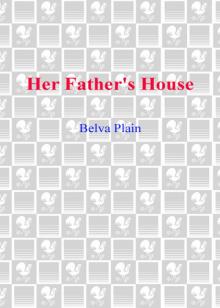 Her Father's House
Her Father's House Whispers
Whispers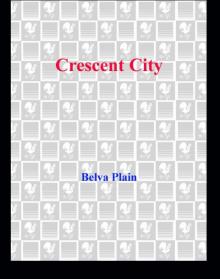 Crescent City
Crescent City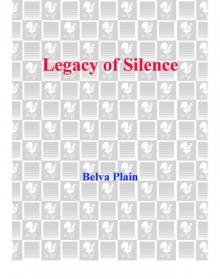 Legacy of Silence
Legacy of Silence Crossroads
Crossroads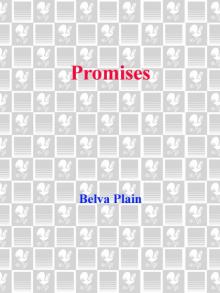 Promises
Promises After the Fire
After the Fire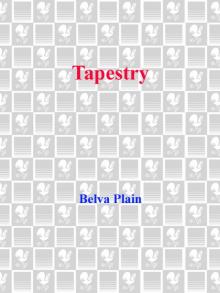 Tapestry
Tapestry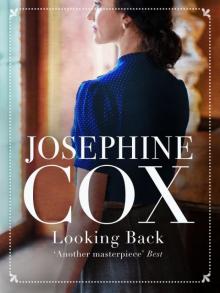 Looking Back
Looking Back Heartwood
Heartwood The Carousel
The Carousel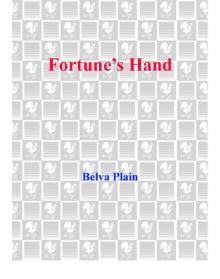 Fortune's Hand
Fortune's Hand Homecoming
Homecoming Random Winds
Random Winds Harvest
Harvest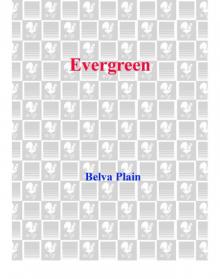 Evergreen
Evergreen Treasures
Treasures The Sight of the Stars
The Sight of the Stars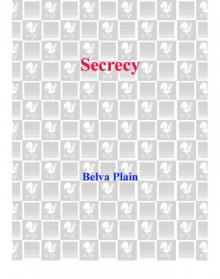 Secrecy
Secrecy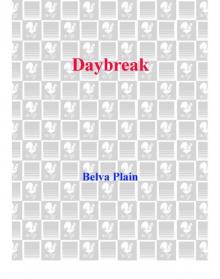 Daybreak
Daybreak Eden Burning
Eden Burning